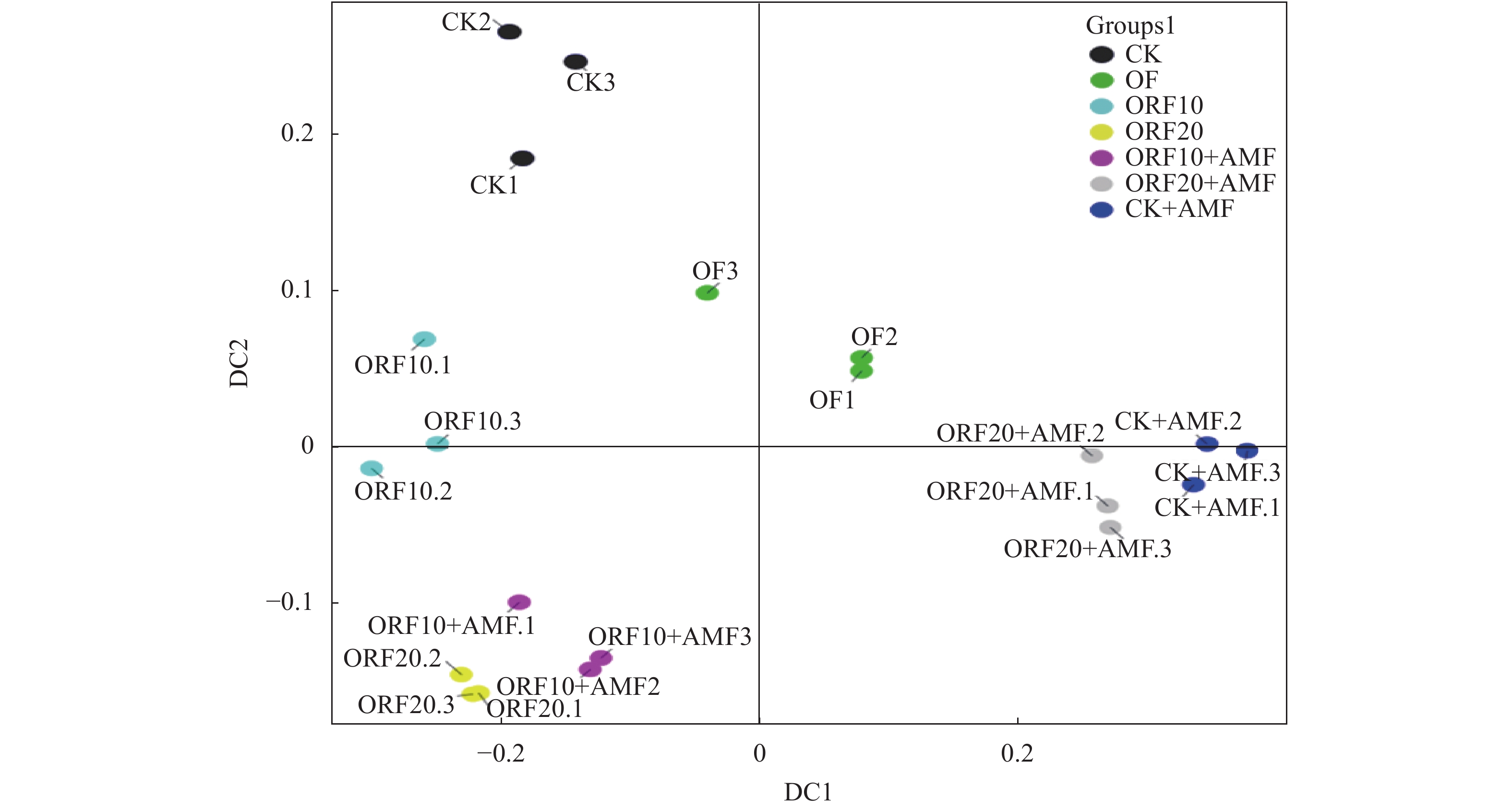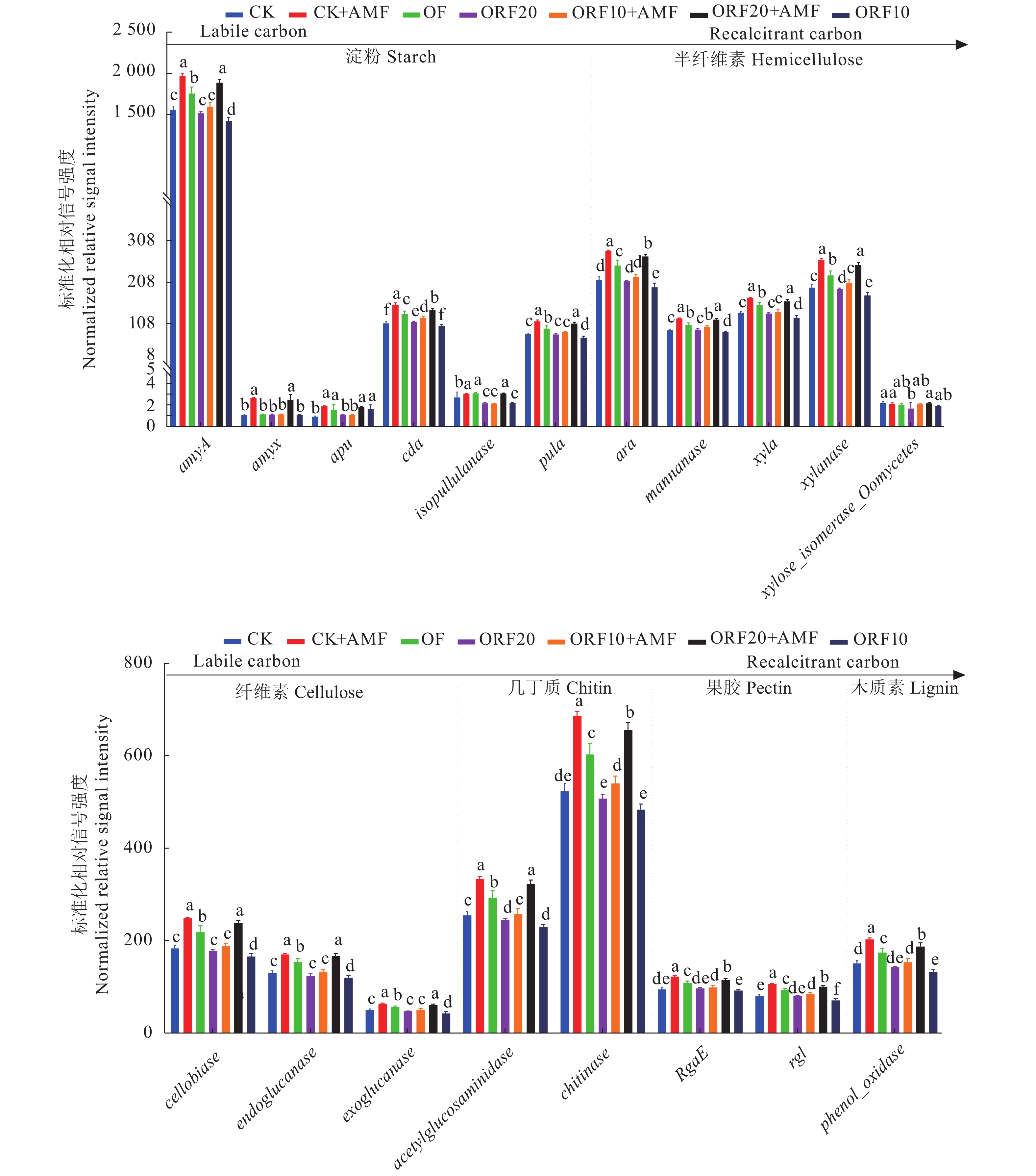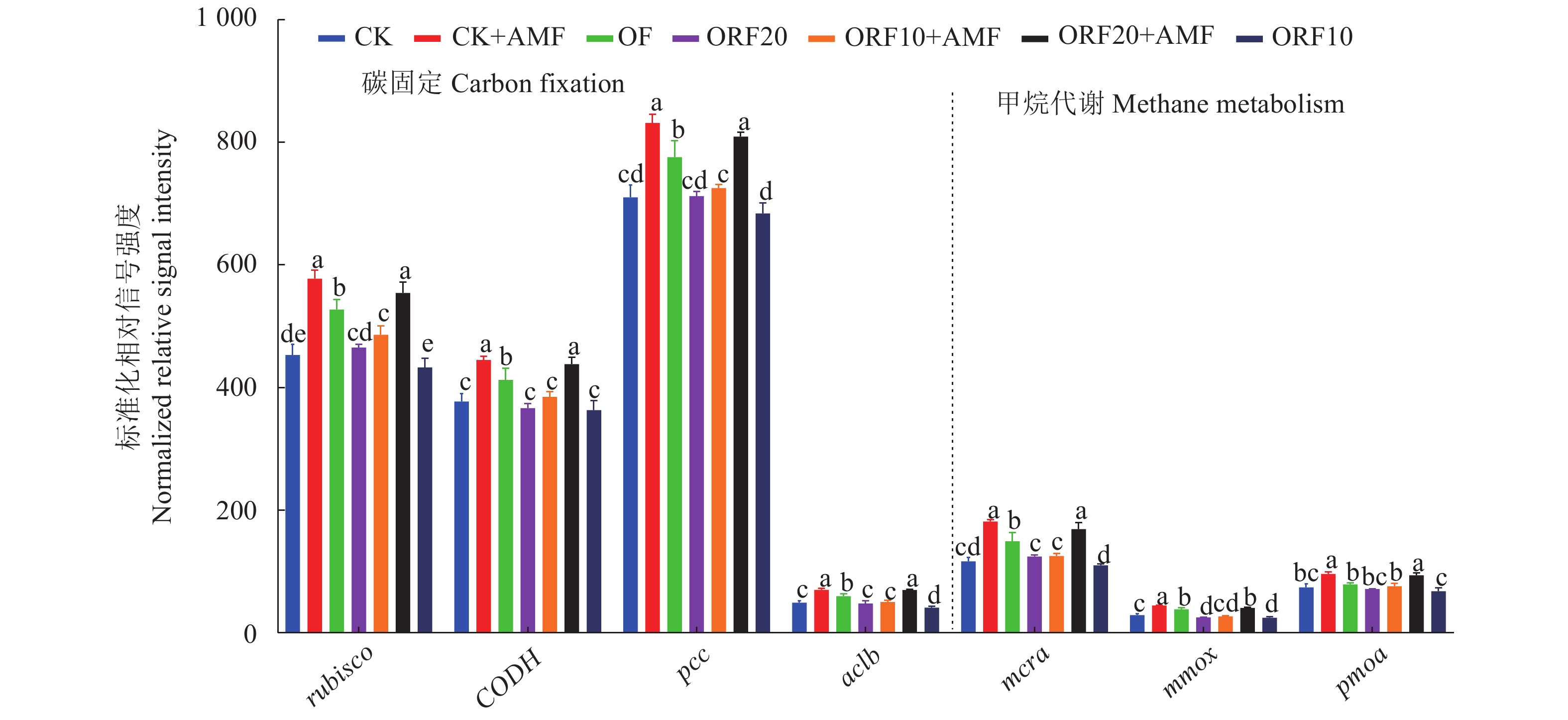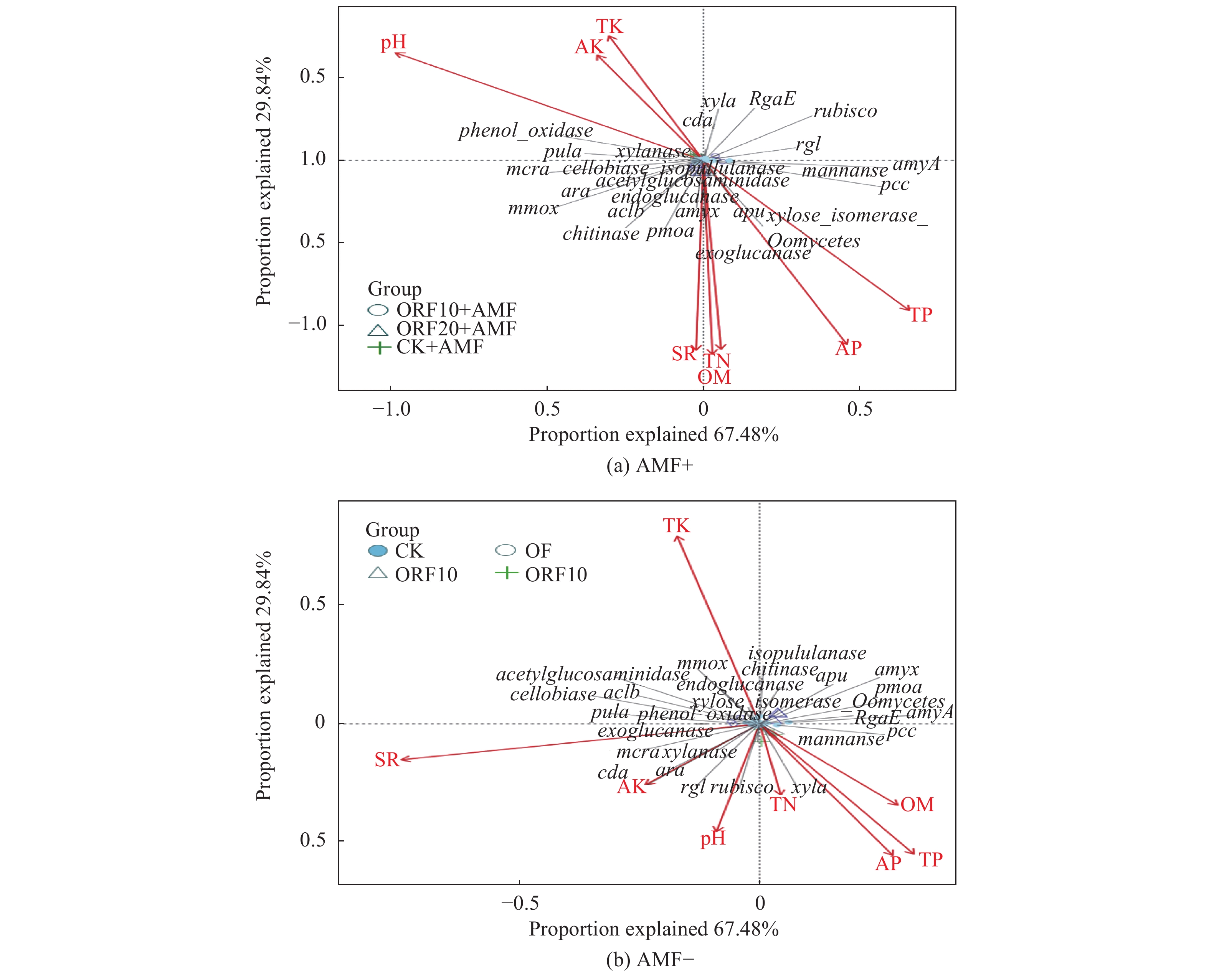Effects of Arbuscular Mycorrhizal Fungi and Organic Fertilizer on Key Microbial Carbon-cycle Genes in Rhizosphere Soil at Sweet Corn Field
-
摘要:目的 研究丛枝菌根真菌(Arbuscular mycorrhizal fungi, AMF)与有机肥配施对甜玉米根际土壤微生物群落碳循环功能基因的影响,揭示AMF与有机肥配施对甜玉米根际土壤碳循环的生物学机制,为AMF配施有机肥在农田土壤碳转化方面的应用提供理论参考。方法 设置7个处理:(1)CK,不施氮肥;(2)OF,优化施肥;(3)ORF10,有机肥替代10%化学氮肥;(4)ORF20,有机肥替代20%化学氮肥;(5)ORF10+AMF,有机肥替代10%化学氮肥+变形球囊霉菌(Glomus versiforme);(6)ORF20+AMF,有机肥替代20%化学氮肥+变形球囊霉菌(Glomus versiforme);(7)CK+AMF,不施氮肥+变形球囊霉菌(Glomus versiforme);每个处理3个重复。利用基因芯片(GeoChip5.0)技术,对7个处理甜玉米根际土壤关键碳循环功能基因进行分析。结果 AMF与有机肥配施对甜玉米产量具有显著的增产效果,在CK、ORF10、ORF20施肥水平下增施变形球囊霉菌后,甜玉米的鲜苞产量分别较不增施变形球囊霉的处理提升32.6%、8.6%、8.9%。测序结果显示,AMF与有机肥配施显著改变了甜玉米根际土壤微生物碳循环功能基因的结构特征。在关键碳循环基因水平上,与碳循环有关的碳分解、碳固定和甲烷代谢3个过程总体上表现为CK+AMF与ORF20+AMF两个处理的基因相对信号强度均高于其他处理。关键碳循环功能基因与环境因子的冗余分析显示,土壤呼吸、全氮、pH、全钾、有机质、速效磷、全磷等土壤养分是影响碳循环功能基因的主要因素。结论 AMF与有机肥配施能显著提高甜玉米的鲜苞产量,同时也改变了甜玉米根际土壤碳循环功能基因的结构特征,不同程度提高了碳分解、碳固定、甲烷代谢等过程的功能基因的相对信号强度。Abstract:Objective Effect of arbuscular mycorrhizal fungi (AMF) and organic fertilizer applied in sweet corn field on the microbial genes relating to the carbon (C) cycling in the rhizosphere was studied to decipher the biological mechanism and the soil C-transformation.Method Seven treatments with triplicates each were applied on the sweet corn fields including (1) no N fertilizer (CK), (2) optimized fertilization (OF), (3) organic N fertilizer to replace 10% of chemical N fertilizer (ORF10), (4) organic N fertilizer to replace 20% of chemical N fertilizer (ORF20), (5) ORF10 with added Glomus versiforme (ORF10+AMF), (6) ORF20 with added G. versiforme (ORF20+AMF), and (7) CK with added G. versiforme (CK+AMF). Genes related to C-cycling in the treated rhizosphere soils were analyzed using GeoChip 5.0 technology.Result Addition of AMF in fertilizing the sweet corn plants significantly increased the yield. By adding AMF to CK, ORF10, and ORF20, the treatments increased the number of fresh buds on the plants by 32.6%, 8.6%, and 8.9%, respectively. The results of gene sequencing on the soil samples showed that the AMF/organic fertilizer combinations significantly altered the structure of the microbial C-cycle genes. The signal strength of key functional genes associated with C-cycling, such as C-decomposition, C-fixation, and methane metabolism, were generally stronger under CK+AMF and ORF20+AMF than the other treatments. According to the redundancy analysis, the respiration, total nitrogen, pH, total potassium, organic matter, available phosphorus, and total phosphorus in rhizosphere soil were the major environmental factors affecting the functions of the C-cycle-related genes.Conclusion The application of organic fertilizer and G. versiforme in sweet corn field significantly increased the fresh bud count on the plants. It changed the structure of the microbial C-cycle genes in rhizosphere soil positively affecting the decomposition and fixation of C as well as the methane metabolism of the ecosystem.
-
Keywords:
- Sweet corn /
- arbuscular mycorrhizal fungi /
- rhizosphere soil /
- soil microbe /
- functional genes /
- carbon-cycle
-
0. 引言
【研究意义】随着国家绿色发展战略和农药化肥减施政策的提出,充分利用农闲田种植绿肥,还田培肥地力,提高农作物产量和质量,已成为促进化肥减量增效及农业可持续发展的重要手段[1]。红萍,学名满江红(Azolla Lam.),江浙一带又称绿萍,具有固氮[2]、富钾[3]、增磷效[4]、培肥[5]等多重生态功能,繁殖力强[6],是稻田生态系统中一种重要的水生绿肥。通过倒萍(将红萍埋入土中进行的还田操作)或插秧前耘田翻压,腐解后释放的养分可供后茬作物当季利用,替代部分化肥的同时还能改善土壤养分状况,是实现稻田土壤可持续利用的有效途径,在稻田化肥减施增效方面具有巨大潜力。开展红萍绿肥替代化肥效应的量化研究,对于红萍绿肥利用具有重要的指导意义。【前人研究进展】早在20世纪70~80年代,就有许多学者对稻田红萍的减肥增效作用进行了研究,在不同耕作制度和施肥水平下红萍替代化肥的效果不同,如早稻田用红萍做基肥或套养红萍作追肥,施用70%红萍氮可以相当于70%化肥氮的效果(每667m2总施氮量为12.25 kg),而在萍-稻-稻耕作制下,红萍氮可以替代总施氮量的30%~40%(每667m2施氮量为7~8 kg)[7]。近年来,随着国家高质量发展战略的提出,越来越多的学者关注红萍绿肥利用研究,并将利用从稻田[8-11]扩展到旱地[12-13],关注点也逐渐从减肥增效[10-11]向固碳减排[9,14]倾斜。而关于稻田红萍绿肥利用的研究更多地集中在红萍与水稻共生或红萍与其他有机物料共同还田方面,如红萍和水稻秸秆联合还田,可以促进土壤碳氮矿化[8];联合使用红萍和脲酶抑制剂的施肥模式可以减少农田NH3挥发,促进水稻增产[9];红萍与水稻共作,可以减少稻田15%~30%的氮肥施用,减少氨挥发[10]等。红萍单独还田在稻田化肥减施方面的研究仅见Malyan的报道,认为红萍替代25%尿素氮后,水稻仍有增产[11]。【本研究切入点】近年来,随着耕作制度的变革,单季稻已逐渐发展成为南方稻区水稻(Oryza sativa)生产主要的耕作方式。红萍作为水生绿肥在新型耕作制度下对水稻化肥减量增效有很好的作用,但其减肥量和减肥效果都不甚明确,这些都亟待开展系统的量化研究。此外,前人通常利用冬闲田(12月至次年4月)养殖红萍,通过红萍多次倒萍腐烂起到养地肥田作用,但该法在复种指数高的地区势必影响冬种面积,且冬季红萍的繁殖能力不强,有些寒冷地区甚至需要增加防护措施才能保证萍母越冬。实际上在春季,单季稻插秧前(3~5月),气温达15 ℃以上时,养殖1~2个月红萍的产量就可达30 t·hm−2以上[7]。如果扩繁的红萍就地还田能为当季水稻提供肥效,将为红萍的利用与化肥减施增效提供新的途径。【拟解决的关键问题】为了明确新型耕作制度下,红萍还田对单季稻化肥减施及改良土壤的可行性和效果,在福建省粮食主产区浦城县开展红萍还田减肥试验,以春季培养可获得的30 t·hm−2红萍鲜萍还田,研究不同减肥处理下红萍翻压还田对单季稻生长、产量的影响和改土减肥的效果,旨在为红萍在单季稻中的利用提供数据支持,对于红萍在单季稻耕作制度下的减肥增效技术的应用和推广具有实际意义。
1. 材料与方法
1.1 试验材料
试验于2021年5月~10月在福建省浦城县莲塘镇马西村(经度118°29′50″,纬度27°59′2″,海拔255.75 m)进行,还田红萍为当地冬闲田种植的红萍,鲜萍平均含水率为92.23%,干物质中含全N 1.94%、全P 0.21%、全K 1.46%。种植的水稻品种为中稻嘉丰优2号。试验地土壤为灰泥田,土壤肥力为中上水平,耕层土壤(0~20 cm),有机质26.60 g·kg−1,碱解氮103.83 mg·kg−1,有效磷49.60 mg·kg−1,速效钾68.67 mg·kg−1,pH 4.92。
1.2 试验设计
试验共设6个处理,每个处理3次重复。T1:不施红萍和化肥;T2:常规(配方)施肥;T3:常规(配方)施肥+红萍还田;T4:减少常规施肥氮、钾肥用量20%+红萍还田;T5:减少常规施肥氮、钾肥用量40%+红萍还田;T6:减少常规施肥氮、钾肥用量60%+红萍还田。红萍还田量均为30 t·hm−2鲜萍。小区面积24 m2(6 m×4 m),小区间以地沟隔开,外设保护行。各小区随机区组排列。
1.3 供试肥料及施用方法
试验中常规施肥水平为N 180 kg·hm−2、P2O5 60 kg·hm−2、K2O 90 kg·hm−2。氮、磷和钾肥分别为尿素(46% N)、过磷酸钙(12% P2O5)和氯化钾(60% K2O)。磷肥全部作基肥,氮肥和钾肥按m(基肥)∶m(分蘖肥)∶m(穗肥)=4∶3∶3施用。基肥于水稻移栽前1 d施入,分蘖肥在移栽后5~7 d撒施,穗肥在水稻幼穗分化2期施用。各小区施肥及田间管理措施相同。水稻采用单本插秧,株行距23 cm×23 cm。各处理具体施肥量见表1。
表 1 不同处理小区施肥量Table 1. Amounts of fertilizer applied on plots for treatments处理
Treatment红萍还田量
Plow-down amount/kg基肥
Base fertilizer分蘖肥
Tiller fertilizer孕穗肥
Booting fertilizer尿素
Urea/g过磷酸钙
Superphosphate/g氯化钾
Potassium chloride/g尿素
Urea/g氯化钾
Potassium chloride/g尿素
Urea/g氯化钾
Potassium chloride/gT1 0 0 0 0 0 0 0 0 T2 0 375.65 1200.00 144.00 281.74 108.00 281.74 108.00 T3 72.00 375.65 1200.00 144.00 281.74 108.00 281.74 108.00 T4 72.00 300.52 1200.00 115.20 225.39 86.40 225.39 86.40 T5 72.00 225.39 1200.00 86.40 169.04 64.80 169.04 64.80 T6 72.00 150.26 1200.00 57.60 112.70 43.20 112.70 43.20 表中施肥量为单个小区(24 m2)的施肥量。
The fertilization amount in the table is the fertilization amount of a single plot (24 m2).1.4 田间操作管理
整地耘田后划出小区,小区田埂包膜,各小区设置独立进排水口,插秧前10 d将红萍按处理设置的还田量施入小区,人工翻压均匀。试验水稻5月1日播种育秧,5月5日进行小区隔离,5月25日红萍翻压入田,6月9日施基肥,6月15日水稻插秧移栽,7月1日施分蘖肥,8月4日施孕穗肥。10月13日收割,小区单打单收,实割测产。
1.5 测定项目及方法
水稻成熟后,各小区单收测产。同时每小区采水稻3穴地上部进行室内考种,记录稻谷和稻草鲜重产量,测定样品干重。并取各小区耕层土壤(0~20 cm)测定pH、有机质、碱解氮、有效磷和速效钾。其中土壤pH、有效磷和速效钾的测定分别采用中华人民共和国农业行业标准《NY/T 1377—2007 土壤pH的测定》[15]、《NY/T 1121.7—2014 土壤检测 第7部分:土壤有效磷的测定》[16]和《NY/T 889—2004 土壤速效钾和缓效钾含量的测定》[17]的方法;土壤有机质和碱解氮的测定分别采用鲍士旦的重铬酸钾容量法——外加热法和碱解扩散法[18]。
1.6 数据处理与分析
数据用Excel和SPSS 19.0进行统计和分析,以平均值±标准差的形式表示,显著性分析采用LSD法(P<0.05)。
文中经济效益相关指标的计算公式如下:
单位面积水稻产值/(万元⋅hm−2)=(单位面积稻谷产量×稻谷单价)/10000 单位面积水稻种植成本/(元·hm−2)=单位面积肥料投入成本+单位面积红萍还田成本
单位面积肥料投入成本/(元⋅hm−2)=∑(小区各类型肥料投入量×肥料单价)/24×10000 单位面积水稻种植收益/(万元·hm−2)=(单位面积水稻产值−单位面积水稻种植成本)/10000
式中,稻谷单价按2.8 元·kg−1计算,10000为换算系数,各处理肥料投入量见表1,其中尿素(46% N)、过磷酸钙(12% P2O5)和氯化钾(60%K2O)的单价分别按浦城当地市场价格3.6、1.9、4.8 元·kg−1计算。
2. 结果与分析
2.1 红萍还田对水稻产量的影响
红萍还田对水稻产量有显著影响(表2)。与无肥处理(T1)相比,不同处理对水稻的增产效应为T4>T3>T2>T5>T6。其中,T4处理(氮、钾肥减量20%+红萍还田)稻谷产量最高,显著高于除T3外的其他处理(P<0.05),比常规施肥处理(T2)平均增产11.11%。氮、钾肥减量40%或60%并辅以红萍还田的处理(T5和T6),分别比常规施肥处理(T2)减产0.92%、4.86%,但差异未达显著性水平(P<0.05)。
表 2 红萍还田对水稻产量的影响Table 2. Effect of Azolla application on rice yield处理
Treatment稻谷产量
Grain yield/(t·hm−2)比T1
Compared to T1比T2
Compared to T2秸秆产量
Straw yield/(t·hm−2)收获指数
Harvest index增产量
Yield increment/(t·hm−2)增产率
Yield increase rate/%增产量
Yield increment/(t·hm−2)增产率
Yield increase rate/%T1 7.32±0.09 d — — — — 6.59±0.11 c 0.53±0.01 a T2 9.07±0.30 bc 1.75 23.86 — — 8.90±1.34 ab 0.51±0.03 a T3 9.68±0.26 ab 2.36 32.28 0.62 6.80 9.82±1.11 a 0.50±0.03 a T4 10.07±0.35 a 2.75 37.63 1.01 11.11 9.51±0.66 ab 0.51±0.02 a T5 8.98±0.86 bc 1.66 22.73 −0.08 −0.92 7.80±1.43 bc 0.54±0.03 a T6 8.63±0.91 c 1.31 17.84 −0.44 −4.86 8.33±0.49 abc 0.51±0.02 a 同列不同字母表示不同处理间差异显著(P <0.05); “―”表示未参与比较。下同。
The different letters in the same column indicate significant difference between different treatments (P < 0.05)." —"means not participating in the comparison. Same as below.地上部秸秆产量以T3最高,与T2、T4、T6无显著差异,但与T1、T5有显著差异(P<0.05)。收获指数T5最高,但与其他处理无显著性差异。从稻谷产量、秸秆产量和收获指数结果看,T4处理对提高水稻产量效果最好,说明每公顷翻压30 t红萍鲜萍,可以替代常规施肥中20%的氮钾肥,还能显著提高稻谷产量。
2.2 红萍还田对水稻产量构成因素的影响
红萍还田对水稻产量构成因素的影响结果见表3。各处理对水稻的穗粒数、结实率无显著影响,但对株高、有效分蘖数、丛穗数、穗长、千粒重有显著影响。株高以T3最高,与T2、T4无显著差异,显著高于T1、T5、T6(P<0.05)。有效分蘖数以T4最高,与T2、T3、T5无显著差异,与T1、T6差异显著(P<0.05)。丛穗数以T3、T4最高,与T5无显著差异,与T1、T2、T6差异显著(P<0.05)。穗长以T1最低,除T6外,其他处理均显著高于T1(P<0.05)。千粒重以T6最高,与T3差异显著(P<0.05),与其他处理无显著性差异。说明减氮钾肥20%,并辅以红萍还田的处理(T4)提高了水稻株高、有效分蘖数和丛穗数,且对水稻丛穗数的影响达到显著性水平(P<0.05)。而在红萍还田的情况下,减肥至40%以上,水稻的株高、有效分蘖数开始明显降低,并在减氮钾肥60%+红萍还田处理(T6)下对水稻的有效分蘖数产生显著降低的影响(P<0.05)。
表 3 红萍还田对水稻产量构成因素的影响Table 3. Effect of Azolla application on rice yield components处理
Treatment株高
Plant height/cm有效分蘖数
No. of effective tillers丛穗数
No. of spike per plant穗长
Spike length/cm穗粒数
No. of grains per spike结实率
Seed setting rate/%千粒重
1000 grain weight/gT1 125.03±1.76 d 5.27±0.35 c 5.56±0.39 c 22.50±0.20 b 275.24±24.12 a 91.00±0.04 a 25.43±0.70 a T2 140.91±3.80 abc 7.62±0.39 a 7.07±0.78 bc 24.22±0.47 a 287.12±23.79 a 91.70±0.01 a 25.29±0.64 a T3 145.33±0.71 a 7.84±0.37 a 8.33±0.00 a 23.95±0.46 a 299.13±15.24 a 81.67±0.11 a 23.70±1.22 b T4 144.25±3.43 ab 7.87±0.58 a 8.33±0.34 a 23.70±0.71 a 264.46±24.49 a 87.67±0.04 a 24.47±0.72 ab T5 138.46±4.70 bc 6.87±0.70 ab 8.00±1.20 ab 23.68±1.00 a 283.35±12.03 a 88.33±0.09 a 25.53±0.15 a T6 137.49±3.75 c 6.11±0.84 bc 6.11±0.51 c 23.48±0.59 ab 279.03±52.64 a 88.98±0.04 a 25.60±0.36 a 2.3 红萍还田的经济效益分析
试验根据市场价格对各处理进行经济效益分析比较,结果见表4。红萍还田主要的成本在于还田红萍萍母的养殖成本及红萍萍母的投放人工费,而红萍还田可结合插秧前耘田一起进行,故与常规施肥处理相比不增加还田费用。据报道,越冬萍母田平均每667 m2花工4个[7],折工费500元,需肥料或农药约20元,合计每667 m2耗本约520元。按冬闲田平均每667 m2产萍7500 kg[7]折算,扩繁每公斤萍母需耗本0.07元。春季单季稻田每667 m2需投放萍母200~250 kg[19],故每公顷所需母萍的成本约210~262.5元。每公顷投放母萍按1个工计,则稻田红萍绿肥利用每公顷共需耗本约330~380元。经扣除肥料和红萍还田成本后,收益以T4处理最好,显著高于T1、T5和T6处理(P<0.05),收益比T1处理增加31.17%,比T2处理增加11.07%,增收2680.58元·hm−2,但未达显著性水平。说明实施红萍绿肥还田,不仅能减少后季水稻化肥施用量20%,还能增加经济收益。
表 4 红萍还田对水稻经济效益的影响Table 4. Effect of Azolla application on economic benefits for rice farming处理
Treatment产值
Output value/ (万元·hm−2)肥料成本
Fertilizer cost/(元·hm−2)红萍还田成本
The cost of returning Azolla to the field/(元·hm−2)收益
Income/(万元·hm−2)收入比T1增加
Income increased
over T1/%收入比T2增加
Income increased
over T2/%T1 2.05±0.03 c 0 0 2.05±0.03 c — — T2 2.54±0.08 b 1194.00 0 2.42±0.08 ab 18.09 — T3 2.71±0.07 ab 1194.00 380.00 2.55±0.07 ab 24.75 5.64 T4 2.82±0.10 a 978.00 380.00 2.69±0.10 a 31.17 11.07 T5 2.52±0.24 b 762.00 380.00 2.40±0.24 b 17.84 −0.21 T6 2.42±0.26 b 546.00 380.00 2.32±0.26 bc 13.47 −3.91 2.4 红萍还田对水稻收获后土壤养分含量的影响
红萍还田对水稻收获后土壤养分含量的影响结果见表5,施化肥显著降低了土壤pH(P<0.05),而红萍还田并减肥的处理(T4、T5、T6)pH比100%施肥的处理(T2)pH均有所提高。可见,利用红萍还田,减少化肥施用,可以缓解土壤酸化。红萍还田处理,土壤有机质平均含量均高于无红萍还田的处理(T2)。其中T3处理有机质含量比T2提高了2.77 g·kg−1,且差异显著(P<0.05)。此外,红萍还田处理的土壤碱解氮、有效磷和速效钾含量也均比无红萍还田处理高,但差异没有显著性。其中减60%氮钾肥并辅以红萍还田的处理(T6)速效钾含量比100%施肥处理(T2)显著提高(P<0.05)。说明红萍还田替代化肥施用,可减缓化肥引起的土壤酸化的同时,还可以增加土壤有机质、碱解氮、有效磷和速效钾等养分的积累。
表 5 红萍还田对水稻收获后土壤养分含量的影响Table 5. Effect of Azolla application on nutrients in soil after rice harvest处理
TreatmentpH 有机质
Organic matter/
(g·kg−1)碱解氮
Alkaline hydrolyzed
nitrogen/(mg·kg−1)有效磷
Available phosphorus/
(mg·kg−1)速效钾
Available
potassium/(mg·kg−1)T1 4.97±0.04 a 29.01±3.07 ab 141.56±24.12 a 43.26±5.09 a 42.52±4.38 ab T2 4.89±0.04 b 27.10±3.38 b 138.44±15.88 a 43.75±5.91 a 41.85±6.07 b T3 4.88±0.04 b 29.87±3.72 a 150.50±22.95 a 43.90±6.30 a 47.01±12.98 ab T4 4.93±0.03 ab 28.81±2.14 ab 144.86±11.16 a 45.36±5.13 a 45.68±1.51 ab T5 4.92±0.01 ab 28.59±1.27 ab 144.09±13.37 a 49.46±4.38 a 45.35±1.07 ab T6 4.91±0.03 ab 30.43±2.13 a 157.50±9.26 a 46.60±2.60 a 55.66±9.35 a 3. 讨论
3.1 红萍还田对水稻生长的影响
大量的生产实践和科学研究已证明红萍对水稻生长发育具有促进作用[20],具体表现为前期抑制,中期赶上,后期促进的效果[21]。王在德等[21]研究认为,红萍还田腐解会释放大量养分,促进水稻生长,推迟有效分蘖的终止期,株高和生物学产量均高于不施萍的对照。本试验结果亦是如此。同样100%施肥,施萍还田处理(T3)的株高,有效分蘖数和生物学产量均高于不施萍的处理(T2)。红萍还田主要是增进水稻中后期的营养,如果水稻在早期受抑不重,后期供肥适时,就会增加穗数,如果后期供肥不过量,就会增进结实率和千粒重取得增产[21]。本试验中,红萍还田显著增加了水稻丛穗数,并在减施氮钾肥后,水稻结实率和千粒重有明显增加。该结果与王在德等[21]的研究结果一致,也反映了本试验常规施肥处理中水稻后期供肥有过剩的可能。
3.2 红萍还田的减肥效应
前人对红萍还田减肥增效作用的研究结果不甚相同,这主要与应用田块的土壤肥力、水稻需肥特性及耕作制度的不同有关。叶国添等[7]报道,早稻田用红萍做基肥或套养红萍作追肥,在每667 m2总施氮量为12.25 kg的情况下,施用70%红萍氮可以相当于70%化肥氮的效果,而在萍-稻-稻耕作制下,每667 m2施氮量为7~8 kg时,用红萍氮替代总施氮量的30%~40%,水稻产量还能增产3.46%~5.21%。Malyan等[11]研究认为红萍替代25%尿素氮后,水稻产量比100%施尿素氮的处理增加14.8%。本试验是在单季稻耕作制下开展的研究,应用的水稻品种——嘉丰优2号属于耐肥能力强的品种,试验地块的土壤肥力属于中上水平(土壤有机质26.60 g·kg−1,碱解氮103.83 mg·kg−1,有效磷49.60 mg·kg−1,速效钾68.67 mg·kg−1),此土壤条件下每公顷翻压30 t红萍不仅可以替代常规施肥中20%的氮钾肥(T4),还能显著增加稻谷产量(比常规施肥增产1.01 t·hm−2,P<0.05),替代40%的氮钾肥(T5),稻谷产量虽略有减少,但与常规施肥相比没有显著差异(P>0.05)。可见,调整后期施肥策略(适当减施),可替代更多数量的化肥。此外,前人研究认为红萍钾的效益可以达到甚至略高于同数量化肥钾的效益[22],本试验也尝试利用红萍替代钾肥,减氮的同时也减同比例钾,试验水稻未出现明显缺钾症状,说明红萍的钾对当季水稻的生产是有效的。
3.3 红萍还田的经济效益
明确红萍还田的经济效益,是推广红萍利用的重要依据。稻田红萍绿肥利用时,通常是利用冬闲田养萍,随插秧前的耘田实现红萍还田,故红萍还田的成本主要在萍母养殖和投放上。叶国添等[7]对萍母田的产萍量、花工和耗本都做了详细的统计,每元可平均产萍442 kg。现如今,人工成本大幅上涨,红萍绿肥利用的成本也随之升高。经本试验统计,现如今每元可平均产萍仅14.3 kg,成本增加了近30倍。尽管如此,红萍还田增产减肥的效益明显,减氮钾肥20%,扣除红萍还田成本后,仍比常规施肥增收2680.58元·hm−2。另一方面,生态种养的价值在现代化农业中越发凸显。据报道,南方稻区冬闲田种植紫云英在一个轮作周期中能够产生1.125万元·hm−2的生态价值[23],倘若对红萍还田的生态效应进行价值核算,预计这部分的效益将远远超过水稻增产减肥带来的直接经济效益。此外,经多年调查和实践发现,连年生长红萍的田块,每到春季可自然生萍,不需额外投放母萍或作为新增地块替代施肥的萍母地,这将大大降低红萍绿肥利用的投入成本,显著提高红萍还田的增收效果。可见,实施红萍还田,尤其是连年红萍还田,不仅减肥还能增收。
3.4 红萍还田的改土培肥效果
大量研究表明,施用化肥显著降低农田土壤pH[24]。而绿肥还田后土壤有机质含量明显提高,pH值上升[25]。施书莲等[26]报道,100 kg红萍的干物质在一年内就可以转化成39 kg土壤有机质。Singh等[27]的盆栽模拟试验表明,红萍还田后,土壤pH呈上升趋势。本试验也表明,施用化肥会导致土壤酸化,而红萍还田并减少氮钾肥施用可明显提高土壤pH和有机质,可见红萍改土培肥效果显著。研究表明,绿肥还田对土壤肥力的影响及对后茬作物增产节肥效应的发挥随翻压年限的增加而增强[28, 29],红萍亦是如此[30]。利用红萍还田,减少化肥施用,是改善稻田土壤酸化的有效措施,但红萍翻压还田改土培肥需要长期的施用累积,才能达到显著效果。
4. 结论
红萍还田量达30 t·hm−2时,不仅可以替代常规施肥中20%的氮钾肥,还能显著增加稻谷产量(比常规施肥处理增产11.11%,P<0.05),并达到培肥地力(比常规施肥处理平均增加土壤有机质1.71 g·kg−1,碱解氮6.42 mg·kg−1,有效磷1.61 mg·kg−1,速效钾3.83 mg·kg−1,P>0.05)的作用,是实现单季稻减肥增效的有效措施。
-
图 4 碳循环基因与理化性质的冗余分析
注:TN,总氮;AP,有效磷;TP,全磷;OM,有机质;TK,总钾;AK,速效钾;SR,土壤呼吸。
Figure 4. Redundant analysis on carbon cycle genes and physicochemical properties
Note: TN- total nitrogen; AP- available phosphorus; TP- total phosphorus; OM- organic matter; TK- total potassium; AK- available potassium; SR- soil respiration.
表 1 不同处理施肥方案
Table 1 Fertilization treatments
处理 Treatment 施肥用量 Fertilization dosage/(kg·hm-2) N P2O5 K2O 有机肥 Organic fertilizer CK,不施氮肥 0 150 225 OF,优化施肥 330 150 225 ORF10,有机肥氮替代10%化学氮肥 297 150 225 1650 ORF20,有机肥氮替代20%化学氮肥 264 150 225 3300 ORF10+AMF,有机肥氮替代10%化学氮肥+增施变形球囊霉菌(G. versiforme) 297 150 225 1650 ORF20+AMF,有机肥氮替代20%化学氮肥+增施变形球囊霉菌(G. versiforme) 264 150 225 3300 CK+AMF,不施氮肥+增施变形球囊霉菌(G. versiforme) 0 150 225 表 2 不同施肥下甜玉米产量与理化性质分析
Table 2 Yield and physicochemical properties of sweet corn under different treatments
处理 Treatment 产量 Yield/(kg·hm−2) 有机质含量 Organic content/(g·kg−1) 土壤呼吸 Soil respiration/(kg·hm−2·h−1) CK 7288.00±288.79 d 21.98±0.15 b 38.58±2.60 c OF 14246.20±469.13 b 22.06±0.60 b 54.64±5.68 b ORF10 14651.00±275.12 b 23.16±1.69 b 40.25±0.96 c ORF20 14925.00±855.37 b 24.03±2.06 ab 47.76±4.17 bc ORF10+AMF 15911.00±325.41 a 22.88±1.21 b 53.39±4.26 b ORF20+AMF 16250.00±630.72 a 25.97±2.57 a 74.66±10.02 a CK+AMF 9663.00±764.32 c 21.86±0.19 b 45.05±8.42 bc 显著性Significance P值 P Value AMF <0.001 <0.476 <0.001 有机无机配施(OCF) <0.001 <0.018 <0.001 AMF×ORF <0.191 <0.380 <0.029 注:同列数据后不同小写字母表示处理间差异显著性(P<0.05)。数据为均值 ± 标准误。
Note: Data with different lowercase letters on the same column indicate significant differences at P<0.05. Data presented as mean±standard error, n=3. -
[1] BARDGETT R D, FREEMAN C, OSTLE N J. Microbial contributions to climate change through carbon cycle feedbacks [J]. The ISME Journal, 2008, 2(8): 805−814. DOI: 10.1038/ismej.2008.58
[2] ZHOU J Z, XUE K, XIE J P, et al. Microbial mediation of carbon-cycle feedbacks to climate warming [J]. Nature Climate Change, 2012, 2(2): 106−110. DOI: 10.1038/nclimate1331
[3] TRIVEDI P, ANDERSON I C, SINGH B K. Microbial modulators of soil carbon storage: Integrating genomic and metabolic knowledge for global prediction [J]. Trends in Microbiology, 2013, 21(12): 641−651. DOI: 10.1016/j.tim.2013.09.005
[4] 郑慧芬, 曾玉荣, 叶菁, 等. 农田土壤碳转化微生物及其功能的研究进展 [J]. 亚热带农业研究, 2018, 14(3):209−216. ZHENG H F, ZENG Y R, YE J, et al. Research advance on soil carbon conversion microorganisms and their functions in farmland ecosystems [J]. Subtropical Agriculture Research, 2018, 14(3): 209−216.(in Chinese)
[5] 王立, 贾文奇, 马放, 等. 菌根技术在环境修复领域中的应用及展望 [J]. 生态环境学报, 2010, 19(2):487−493. DOI: 10.3969/j.issn.1674-5906.2010.02.043 WANG L, JIA W Q, MA F, et al. Perspective of mycorrhizal technology application for environmental remediation [J]. Ecology and Environmental Sciences, 2010, 19(2): 487−493.(in Chinese) DOI: 10.3969/j.issn.1674-5906.2010.02.043
[6] 陆大雷, 刘小兵, 赵久然, 等. 甜玉米氮素吸收利用的基因型差异 [J]. 植物营养与肥料学报, 2008, 14(2):258−263. DOI: 10.3321/j.issn:1008-505X.2008.02.009 LU D L, LIU X B, ZHAO J R, et al. Genotypic differences in nitrogen uptake and utilization of sweet maize [J]. Plant Nutrition and Fertilizer Science, 2008, 14(2): 258−263.(in Chinese) DOI: 10.3321/j.issn:1008-505X.2008.02.009
[7] 张白鸽, 李强, 陈琼贤, 等. 广东甜玉米施肥指标体系研究 [J]. 广东农业科学, 2013, 40(20):67−70. DOI: 10.3969/j.issn.1004-874X.2013.20.022 ZHANG B G, LI Q, CHEN Q X, et al. Research on index system for sweet maize fertilization in Guangdong [J]. Guangdong Agricultural Sciences, 2013, 40(20): 67−70.(in Chinese) DOI: 10.3969/j.issn.1004-874X.2013.20.022
[8] 田善义, 王明伟, 成艳红, 等. 化肥和有机肥长期施用对红壤酶活性的影响 [J]. 生态学报, 2017, 37(15):4963−4972. TIAN S Y, WANG M W, CHENG Y H, et al. Long-term effects of chemical and organic amendments on red soil enzyme activities [J]. Acta Ecologica Sinica, 2017, 37(15): 4963−4972.(in Chinese)
[9] 郭良栋, 田春杰. 菌根真菌的碳氮循环功能研究进展 [J]. 微生物学通报, 2013, 40(1):158−171. GUO L D, TIAN C J. Progress of the function of mycorrhizal fungi in the cycle of carbon and nitrogen [J]. Microbiology China, 2013, 40(1): 158−171.(in Chinese)
[10] 金海如, 蒋湘艳, 夏婷婷. 不同有机物料及其菌根化对甜玉米产量与品质的协同影响 [J]. 中国土壤与肥料, 2019(6):196−203. JIN H R, JIANG X Y, XIA T T. Synergistic effect of different organic matters and mycorrhizal fungi on biomass and quality of sweet maize [J]. Soil and Fertilizer Sciences in China, 2019(6): 196−203.(in Chinese)
[11] 徐如玉, 左明雪, 袁银龙, 等. 增施摩西管柄囊霉对甜玉米氮肥增效及土壤丛枝菌根真菌多样性的影响 [J]. 福建农业学报, 2020, 35(4):379−391. XU R Y, ZUO M X, YUAN Y L, et al. Effects of Funneliformis mosseae application on nitrogen utilization by sweet corn and AM fungi diversity in soil [J]. Fujian Journal of Agricultural Sciences, 2020, 35(4): 379−391.(in Chinese)
[12] 徐丽娇, 姜雪莲, 郝志鹏, 等. 丛枝菌根通过调节碳磷代谢相关基因的表达增强植物对低磷胁迫的适应性 [J]. 植物生态学报, 2017, 41(8):815−825. DOI: 10.17521/cjpe.2017.0018 XU L J, JIANG X L, HAO Z P, et al. Arbuscular mycorrhiza improves plant adaptation to phosphorus deficiency through regulating the expression of genes relevant to carbon and phosphorus metabolism [J]. Chinese Journal of Plant Ecology, 2017, 41(8): 815−825.(in Chinese) DOI: 10.17521/cjpe.2017.0018
[13] 张弘. 相同碳氮比有机物料和生物炭对烤烟品质及土壤碳氮代谢的影响 [D]. 郑州: 河南农业大学, 2017. ZHANG H. Effect of the same C/N ratio organic material and boichar on flue-cured tobacco quality and soil carbon nitrogen metabolism [D]. Zhengzhou: Henan Agricultural University, 2017.(in Chinese)
[14] 梁晋刚, 辛龙涛, 栾颖, 等. 转cry1Ie基因抗虫玉米对根际微生物群落碳代谢的影响 [J]. 中国农业科技导报, 2019, 21(2):104−110. LIANG J G, XIN L T, LUAN Y, et al. Effect of Cry1Ie bt maize on carbon source metabolism of rhizosphere microorganisms [J]. Journal of Agricultural Science and Technology, 2019, 21(2): 104−110.(in Chinese)
[15] 路花, 张美俊, 冯美臣, 等. 氮肥减半配施有机肥对燕麦田土壤微生物群落功能多样性的影响 [J]. 生态学杂志, 2019, 38(12):3660−3666. LU H, ZHANG M J, FENG M C, et al. Effects of half-reduced nitrogen fertilization combined with organic fertilizer on functional diversity of soil microbial communities in oat field [J]. Chinese Journal of Ecology, 2019, 38(12): 3660−3666.(in Chinese)
[16] 孙丹萍. 丛枝菌根真菌扩繁技术研究 [J]. 河南林业科技, 2004, 24(2):12−13, 15. DOI: 10.3969/j.issn.1003-2630.2004.02.006 SUN D P. Study on the propagation technology of arbuscular mycorrhizal fungi [J]. Journal of Henan Forestry Science and Technology, 2004, 24(2): 12−13, 15.(in Chinese) DOI: 10.3969/j.issn.1003-2630.2004.02.006
[17] 毕银丽, 孙欢, 郭楠, 等. 不同基质和菌种组合对丛枝菌根真菌扩繁效果的影响 [J]. 应用与环境生物学报, 2017, 23(4):616−621. BI Y L, SUN H, GUO N, et al. Propagate-effects of different substrates and strain combinations on arbuscular mycorrhizal fungi [J]. Chinese Journal of Applied and Environmental Biology, 2017, 23(4): 616−621.(in Chinese)
[18] ZHAO Y P, LIN S, CHU L X, et al. Insight into structure dynamics of soil microbiota mediated by the richness of replanted Pseudostellaria heterophylla [J]. Scientific Reports, 2016, 6: 26175. DOI: 10.1038/srep26175
[19] 鲍士旦. 土壤农化分析 [M]. 北京: 中国农业出版社, 2000. [20] 鲁如坤. 土壤农业化学分析方法 [M]. 北京: 中国农业科技出版社, 2000. [21] STRALIS-PAVESE N, ABELL G C J, SESSITSCH A, et al. Analysis of methanotroph community composition using a pmoA -based microbial diagnostic microarray [J]. Nature Protocols, 2011, 6(5): 609. DOI: 10.1038/nprot.2010.191
[22] 吕鹏, 张吉旺, 刘伟, 等. 施氮量对超高产夏玉米产量及氮素吸收利用的影响 [J]. 植物营养与肥料学报, 2011, 17(5):852−860. LÜ P, ZHANG J W, LIU W, et al. Effects of nitrogen application on yield and nitrogen use efficiency of summer maize under super-high yield conditions [J]. Plant Nutrition and Fertilizer Science, 2011, 17(5): 852−860.(in Chinese)
[23] 段媛君, 王百田. 不同肥料与AM真菌配施对沙打旺品质的影响 [J]. 西北农林科技大学学报(自然科学版), 2019, 47(5):118−124. DUAN Y J, WANG B T. Effect of different fertilizers and AM fungi on quality of Astragalus adsurgens Pall [J]. Journal of Northwest A & F University (Natural Science Edition), 2019, 47(5): 118−124.(in Chinese)
[24] 周世品. 有机无机肥配施和丛枝菌根化育苗对西瓜产量品质的影响 [D]. 南京: 南京农业大学, 2017. ZHOU S P. Effects of combined organic and inorganic fertilizer and arbuscular mycorrhizal colonization on watermelon yield and quality [D]. Nanjing: Nanjing Agricultural University, 2017.(in Chinese)
[25] 张前兵. 干旱区不同管理措施下绿洲棉田土壤呼吸及碳平衡研究 [D]. 石河子: 石河子大学, 2013. ZHANG Q B. Studies on soil respiration and carbon balance under different management practices in cotton field of oasis in arid region[D]. Shihezi: Shihezi University, 2013.(in Chinese)
[26] 贺美,王迎春,王立刚,等.不同耕作措施对黑土碳排放和活性碳库的影响[J].土壤通报,2016, 47(5):1195-1202. HE M, WANG Y C, WANG L G, et al. Effect of different tillage managements oncarbon dioxide emission and content of activated carbon in black soil [J]. Chinese Journal of Soil Science, 2016, 47(5): 1195-1202.(in Chinese)
[27] HODGE A, FITTER A H. Substantial nitrogen acquisition by arbuscular mycorrhizal fungi from organic material has implications for N cycling [J]. Proceedings of the National Academy of Sciences of the United States of America, 2010, 107(31): 13754−13759. DOI: 10.1073/pnas.1005874107
[28] CHENG L, BOOKER F L, TU C, et al. Arbuscular mycorrhizal fungi increase organic carbon decomposition under elevated CO2 [J]. Science, 2012, 337(6098): 1084−1087. DOI: 10.1126/science.1224304
[29] RUI J P, LI J B, WANG S P, et al. Responses of bacterial communities to simulated climate changes in alpine meadow soil of the Qinghai-Tibet plateau [J]. Applied and Environmental Microbiology, 2015, 81(17): 6070−6077. DOI: 10.1128/AEM.00557-15
[30] TABITA F R. Microbial ribulose1,5-bisphosphate carboxylase/oxygenase: A different perspective [J]. Photosynthesis Research, 1999, 60(1): 1−28. DOI: 10.1023/A:1006211417981
[31] SIEGENTHALER U, SARMIENTO J L. Atmospheric carbon dioxide and the ocean [J]. Nature, 1993, 365(6442): 119−125. DOI: 10.1038/365119a0
[32] 刘洋荧, 王尚, 厉舒祯, 等. 基于功能基因的微生物碳循环分子生态学研究进展 [J]. 微生物学通报, 2017, 44(7):1676−1689. LIU Y Y, WANG S, LI S Z, et al. Advances in molecular ecology on microbial functional genes of carbon cycle [J]. Microbiology China, 2017, 44(7): 1676−1689.(in Chinese)
[33] GIFFORD R M. The global carbon cycle: A viewpoint on the missing sink [J]. Functional Plant Biology, 1994, 21(1): 1. DOI: 10.1071/PP9940001
[34] VAN GROENIGEN K J, OSENBERG C W, HUNGATE B A. Increased soil emissions of potent greenhouse gases under increased atmospheric CO2 [J]. Nature, 2011, 475(7355): 214−216. DOI: 10.1038/nature10176
[35] XUE K, YUAN M M, SHI Z J, et al. Tundra soil carbon is vulnerable to rapid microbial decomposition under climate warming [J]. Nature Climate Change, 2016, 6(6): 595−600. DOI: 10.1038/nclimate2940
[36] PENDALL E, BRIDGHAM S D, HANSON P J, et al. Below-ground process responses to elevated CO2 and temperature: A discussion of observations, measurement methods, and models [J]. New Phytologist, 2004, 162(2): 311−322. DOI: 10.1111/j.1469-8137.2004.01053.x
[37] FORSTER P, RAMASWAMY V, ARTAXO P, et al. Changes in atmospheric constituents and in radiative forcing [M] the 4th Assessment Report of the IPCC WG1: The Physical Science Basis. DLR, 2007.
[38] HE Z L, XU M Y, DENG Y, et al. Metagenomic analysis reveals a marked divergence in the structure of belowground microbial communities at elevated CO2 [J]. Ecology Letters, 2010, 13(5): 564−575. DOI: 10.1111/j.1461-0248.2010.01453.x
[39] YERGEAU E, KANG S, HE Z L, et al. Functional microarray analysis of nitrogen and carbon cycling genes across an Antarctic latitudinal transect [J]. The ISME Journal, 2007, 1(2): 163−179. DOI: 10.1038/ismej.2007.24
[40] REEVE J R, SCHADT C W, CARPENTER-BOGGS L, et al. Effects of soil type and farm management on soil ecological functional genes and microbial activities [J]. The ISME Journal, 2010, 4(9): 1099−1107. DOI: 10.1038/ismej.2010.42
[41] LIU Z F, LIU G H, FU B J, et al. Relationship between plant species diversity and soil microbial functional diversity along a longitudinal gradient in temperate grasslands of Hulunbeir, Inner Mongolia, China [J]. Ecological Research, 2008, 23(3): 511−518. DOI: 10.1007/s11284-007-0405-9
[42] WARDLE D A. Ecological linkages between aboveground and belowground biota [J]. Science, 2004, 304(5677): 1629−1633. DOI: 10.1126/science.1094875
[43] ZHANG Y G, CONG J, LU H, et al. An integrated study to analyze soil microbial community structure and metabolic potential in two forest types [J]. PLoS One, 2014, 9(4): e93773. DOI: 10.1371/journal.pone.0093773
[44] ROUSK J, BROOKES P C, BAATH E. The microbial PLFA composition as affected by pH in an arable soil [J]. Soil Biology & Biochemistry, 2010, 42(3): 516−520.
[45] BASTIDA F, MORENO J L, HERNÁNDEZ T, et al. Microbiological activity in a soil 15 years after its devegetation [J]. Soil Biology and Biochemistry, 2006, 38(8): 2503−2507. DOI: 10.1016/j.soilbio.2006.02.022
[46] LI Y Q, XU M, ZOU X M, et al. Soil CO2 efflux and fungal and bacterial biomass in a plantation and a secondary forest in wet tropics in Puerto Rico [J]. Plant and Soil, 2005, 268(1): 151−160. DOI: 10.1007/s11104-004-0234-3
-
期刊类型引用(6)
1. 李文帅,段玉春,范文艳,韩文革,吕清晗,吴皓菘,李明睿,李宝成,姜述君. 节杆菌和腐熟鸡粪混施对Atrazine污染土壤特性影响. 黑龙江八一农垦大学学报. 2024(03): 18-24 .  百度学术
百度学术
2. 郑一玲,范栩妙,钟哲伦,姚光伟,林晨,顾佳艳,靳泽文,平立凤,单胜道. 生物质炭-沼液配施条件下旱地红壤碳氮循环功能基因丰度主控因子与耦合关系. 农业资源与环境学报. 2024(04): 835-845 .  百度学术
百度学术
3. 马啸驰,韩烽,白亚涛,吴双,吴景贵,马艳. 有机物料在果园生态系统中的应用及其环境效应:研究现状与展望. 中国生态农业学报(中英文). 2023(08): 1240-1255 .  百度学术
百度学术
4. 乔志伟,刘超,王红. 一株硝基还原假单胞菌的溶磷特性及对碳循环相关基因的影响. 江苏农业学报. 2023(05): 1151-1158 .  百度学术
百度学术
5. 马慧霞,张桥,陈会巧,孙丽丽,周昌敏,顾文杰,卢钰升,徐培智,解开治. 长期有机培肥对南方红壤区稻田土壤碳循环功能基因的影响. 南方农业学报. 2023(05): 1405-1416 .  百度学术
百度学术
6. 顾美英,唐光木,张云舒,黄建,张志东,张丽娟,朱静,唐琦勇,楚敏,徐万里. 有机肥与生物炭对新疆盐碱沙化土壤微生物群落特征的影响. 生态环境学报. 2023(08): 1392-1404 .  百度学术
百度学术
其他类型引用(12)




 下载:
下载:






